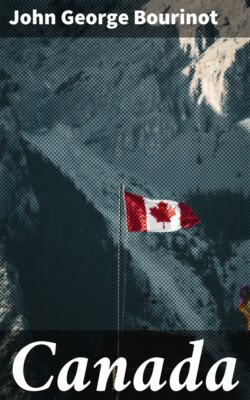Читать книгу Canada - John George Bourinot - Страница 9
На сайте Литреса книга снята с продажи.
View of Cape Trinity on the Laurentian Range.
ОглавлениеThe province of Quebec is famous in the song and story of Canada; indeed, for a hundred and fifty years, it was Canada itself. More than a million and a quarter of people, speaking the language and professing the religion of their forefathers, continue to occupy the country which extends from the Gulf to the Ottawa, and have made themselves a power in the intellectual and political life of Canada. Everywhere do we meet names that recall the ancient régime—French kings and princes, statesmen, soldiers, sailors, explorers, and adventurers, compete in the national nomenclature with priests and saints. This country possesses large tracts of arable land, especially in the country stretching from the St. Lawrence to Lake Champlain, and watered by the Richelieu, that noted highway in Canadian history. Even yet, at the head-waters of its many rivers, it has abundance of timber to attract the lumberman.
The province of Ontario was formerly known as Upper or Western Canada, but at the time of the union it received its present name because it largely lies by the side of the lake which the Hurons and more famous Iroquois called "great." It extends from the river of the Ottawas—the first route of the French adventurers to the western lakes as far as the northwesterly limit of Lake Superior, and is the most populous and prosperous province of the Dominion on account of its wealth of agricultural land, and the energy of its population. Its history is chiefly interesting for the illustrations it affords of Englishmen's successful enterprise in a new country. The origin of the province must be sought in the history of those "United Empire Loyalists," who left the old colonies during and after the War of Independence and founded new homes by the St. Lawrence and great lakes, as well as in Nova Scotia and New Brunswick, where, as in the West, their descendants have had much influence in moulding institutions and developing enterprise.
In the days when Ontario and Quebec were a wilderness, except on the borders of the St. Lawrence from Montreal to the Quebec district, the fur-trade of the forests that stretched away beyond the Laurentides, was not only a source of gain to the trading companies and merchants of Acadia and Canada, but was the sole occupation of many adventurers whose lives were full of elements which assume a picturesque aspect at this distance of time. It was the fur-trade that mainly led to the discovery of the great West and to the opening up of the Mississippi valley. But always by the side of the fur-trader and explorer we see the Recollet or Jesuit missionary pressing forward with the cross in his hands and offering his life that the savage might learn the lessons of his Faith.
As soon as the Mississippi was discovered, and found navigable to the Gulf of Mexico, French Canadian statesmen recognised the vantage-ground that the command of the St. Lawrence valley gave them in their dreams of conquest. Controlling the Richelieu, Lake Champlain, and the approaches to the Hudson River, as well as the western lakes and rivers which gave easy access to the Mississippi, France planned her bold scheme of confining the old English colonies between the Appalachian range of mountains and the Atlantic Ocean, and finally dominating the whole continent.
So far we have been passing through a country where the lakes and rivers of a great natural basin or valley carry their tribute of waters to the Eastern Atlantic; but now, when we leave Lake Superior and the country known as Old Canada, we find ourselves on the northwestern height of land and overlooking another region whose great rivers—notably the Saskatchewan, Nelson, Mackenzie, Peace, Athabasca, and Yukon—drain immense areas and find their way after many circuitous wanderings to Arctic seas.
The Central region of Canada, long known as Rupert's Land and the Northwestern Territory, gradually ascends from the Winnipeg system of lakes, lying to the northwest of Lake Superior, as far as the foothills of the Rocky Mountains, and comprises those plains and prairies which have been opened up to civilisation within two decades of years, and offer large possibilities of power and wealth in the future development of the New Dominion. It is a region remarkable for its long rivers, in places shallow and rapid, and extremely erratic in their courses through the plains.
